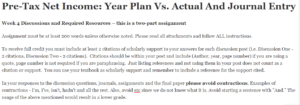Pre-Tax Net Income: Year Plan Vs. Actual And Journal Entry

Week 4 Discussions and Required Resources – this is a two-part assignment
Assignment must be at least 200 words unless otherwise noted. Please read all attachments and follow ALL instructions.
To receive full credit you must include at least 2 citations of scholarly support to your answers for each discussion post (i.e. Discussion One – 2 citations, Discussion Two – 2 citations). Citations should be within your post and include (Author, year, page number) if you are using a quote, page number is not required if you are paraphrasing. Just listing references and not using them in your post does not count as a citation or support. You can use your textbook as scholarly support and remember to include a reference for the support cited.
In your responses to the discussion questions, journals, assignments and the final paper please avoid contractions. Examples of contractions – I’m, I’ve, isn’t, hadn’t and all the rest. Also, avoid etc since we do not know what it is. Avoid starting a sentence with “And.” The usage of the above mentioned would result in a lower grade.
The simulation learning experience will consist of the following: You will be managing and leading a business, called HISCO (in the Medical Equipment Industry), for an entire year (four quarters) and will have to deal with numerous issues in balancing short- and long-term priorities. The terms Qtr. 1 and Q1 are used interchangeably throughout and refer to Quarter 1 of your business. You will have a wide variety of resources at your disposal (Help Desk, faculty, review videos, and data). There will be a pre-test to ensure that you are prepared for the year, Quarterly and Annual Operating/Business Reviews, and finally, the development of an annual report after you have lived the excitement of creating the results through your decisions each quarter. Playing a quarter competitively and analyzing results of your decisions will be the primary source of formal knowledge. Naturally, you will be expected to keep up with the weekly activities which build upon each other.
There is a need to present peer review Journal articles for the discussion questions, assignments and final paper.
NOTE FROM INSTRUCTOR: Pay special attention to the contractions and you must have peer review articles for the initial discussion question and your responses to your peers. Pay attention to when the discussion closes.
Also, be sure to itemized and respond to each question separately. For instance the questions for Week 4 are:
Hisco’s owner, Stan Sloane, would like to know what you have learned so far in the process of running the company that might benefit other employees/students concerning pre-tax income and its importance.
Meet with two other employees/students and share ideas that could help others in a similar employment position as you.
“Pre-Tax Net Income: Year Plan vs. Actual + SRO” Chart Discussion
Prior to beginning work on this discussion thread, read How healthy is your business? 6 ways to take its ‘temperature’ and Why 70% of companies paid zero in corporate taxes: They had zero profits. Hisco’s owner, Stan Sloane, would like to know what you’ve learned so far in the process of running the company that might benefit other employees/students concerning pre-tax income and its importance. Meet with two other employees/students and share ideas that could help others in a similar employment position as you. (Pre-Tax Net Income Chart Explanation)
NOTE: the link to the article listed above is in the Required Resources section. The PPT that goes to the link above is attached.
Week 4 Journal
Include a cover page and 1-2 pages of reflection regarding ideas, concepts, or strategies that you have learned so far in this simulation that you would be able to transfer to a current or a future role. Be specific about how these items can help you as you progress in your career. In the Week 4 Journal, consider how the Strengths, Weaknesses, Opportunities, and Threats from Week 1 are now impacting the performance of the company. Also, consider how keeping track of the Strengths, Weaknesses, Opportunities, and Threats of the company that you work for can help you to improve your performance on an ongoing basis.
Required Resources
Articles
Biery, M. E. (2013, September 1). How healthy is your business? 6 ways to take its ‘temperature.’ (Links to an external site.) Forbes. Retrieved from https://www.forbes.com/sites/sageworks/2013/09/01/how-healthy-is-your-business-using-industry-data-to-check-the-temperature/#26ca43e1704a
- The full-length version of this article is available through the www.forbes.com database. This article provides information about financial metrics that indicate the overall health of the company and will assist you in your Pre-Tax Net Income: Year Plan vs Actual + SRO” chart discussion this week. In particular the article also gives consideration to ratio analysis.
Mathur, A. (2016, April 20). Why 70% of companies paid zero in corporate taxes: they had zero profits (Links to an external site.). Forbes. Retrieved from https://www.forbes.com/sites/aparnamathur/2016/04/20/why-70-of-companies-paid-zero-in-corporate-taxes-they-had-zero-profits/#7a02689c56e3
- The full-length version of this article is available through the www.forbes.com database. This article provides information about profitability of companies before paying taxes and the benefit of having a zero-net income for the company and will assist you in your Pre-Tax Net Income: Year Plan vs Actual + SRO” chart discussion this week.
Multimedia
Cadrain, S. (2017). Pre-Tax Net Income Chart Explanation [Presentation Slides]. Retrieved from https://ashford.instructure.com
- This PowerPoint presentation covers information about how to analyze HISCO’s financial metrics specifically pre-tax and after-tax income. The presentation can be used as a tool to better understand the “Pre-Tax Income: Year Plan vs. Actual” graph located in the Grow Your Business” (GYB) simulation.